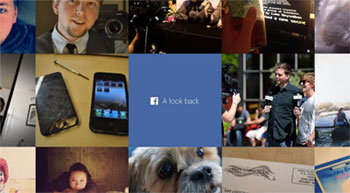 To celebrate its 10th anniversary this week, Facebook produced a free video for most users, which highlighted some of their biggest moments on the social media network since they joined.
To celebrate its 10th anniversary this week, Facebook produced a free video for most users, which highlighted some of their biggest moments on the social media network since they joined.
It was a runaway success. Hundreds of millions immediately accessed their personalised video and then shared it with their friends. The internet was swamped with people getting emotional over the memories – their own, their families’, their friends’.
One bereaved father even issued a tearful video plea for Facebook to send him a personalised video for his late son, who died a couple of years ago. Facebook said it would.
None of us are ever likely to match the enormous resources Facebook put into this project (it took months of planning and programming).
However, there are 5 things that everyone promoting a business online can learn from its project. And who wouldn’t want to learn from the master?
1. Give free gifts. Many companies do not like giving away things for free, which is understandable, but wrong. People love getting things for free, and once they receive something from a company, a tie is formed between them.
Those who receive the gift do not forget so quickly. Prospective clients are more likely to trust and use a brand whose products they have sampled. Both prospective and existing clients are also more likely to feel a sense of obligation to a company which has reached out to them and essentially done them a favour.
For the company, it is an easy way to get people to give their products a trial run and to build up a relationship with new leads – or as Facebook has shown, to cement and nurture its relationship with people who already use it.
Is it any wonder that free gifting has become so popular online, with companies giving out free trials, free white papers and guides, and most importantly, regular free content on social media?
2. Don’t expect anything back. For many companies, there’s a string attached to the gifts we just discussed. You don’t have to pay for most “free” trials and white papers, but the consumer often does have to give something in return, namely their email address.In that sense, while they don’t cost money – they’re not exactly free either.
This is perfectly legitimate and a crucial way for most companies to continue building that bond between them and their new contact.
But Facebook’s initiative also shows how much you have to gain when you give away something that is really, truly, completely free. In Facebook’s case, they gained an enormous amount of good will, free publicity and buzz, which for a company that has often been so heavily criticised – and whose demise has been predicted with alarming regularity over the past few weeks – is worth its weight in gold.
How many people do you think would have accessed their video if Facebook had demanded personal details, a ‘like’ or ‘share’ in return? I’m betting, not nearly as many. There would have been a whiff of cynicism about the whole exercise.
That is why it is always worth retweeting other people who could conceivably help you promote your business, giving influential people in your industry (non-competitors) a platform on your social media and at your events, promoting other people’s products (again, non-competitors), and generally being helpful and informative to other people online – without demanding anything in return, at any stage.
The secret is that you’ll most likely get a return, anyway.
3. It’s about the customer, not the company. Facebook could have celebrated its 10th anniversary by producing a long video about its own founders and its own history. (Well maybe it did and I didn’t notice because my Facebook feed was so swamped with people sharing their ‘Look Back’ videos?)
But it cleverly understood that no one would want to watch that, as its users are not really interested in Facebook – not for its own sake, anyway. People are interested in themselves, and are only interested in Facebook to the extent that it helps or affects them.
So Facebook produced videos about its users.
The upshot was that everyone was perfectly aware of, and even excited about, Facebook’s 10th anniversary – precisely because it avoided the trap of conspicuous self-promotion.
For content marketers, there’s no better example of how understanding what your customers really care about, and engaging with them on that territory, rather than droning on endlessly about your own company pays off.
4. Get emotional. Why, in the end, did Facebook’s videos go viral? Because they appealed to people’s emotions.
And without ever saying so explicitly, they got people to feel just how important a role Facebook has played in their lives over the past decade
Similarly, content marketers need to make their fans and followers feel just what a difference their product will make in their lives – not just tell them – if their content is to have any impact.
5. Make it easy to share. When people posted their Facebook film to their news feed, the following message appeared at the top of their post:
“Here’s my Facebook film. Find yours at https://facebook.com/lookback/#FacebookIs10”.
When they got there, there was a prominent button allowing them to post it to their wall.
Now this one sounds obvious, but you wouldn’t believe how many times people produce great content, but don’t include quick links to Twitter, Facebook, and other social media platforms.
As Facebook knows, the likelihood of people passing on material to others rises dramatically if the idea is explicitly suggested to them, and if they don’t have to think about it too much because the buttons are already there.
So whether you are posting a blog post, sending out an email newsletter, or distributing a PDF guide – help people help you by making the ‘share’ buttons blindingly obvious!
In short, well played, Facebook, well played.
Miriam Shaviv is Director of Content at Brainstorm Digital
If you enjoyed this piece, you might like:
- Face it: Your customers are just not that into you
- Should you dump Facebook in 2014?
- Think employees on social media is a minefield? 4 reasons you should encourage it anyway






